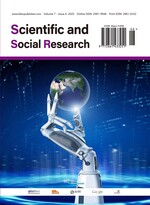Abstract
The development of human civilization has always gone through cycles of rise and fall. This paper looks at three key areas—complex systems theory, power balance mechanisms, and cultural identity—to study the fragility of civilizations. The paper uses historical examples and modern challenges to explain why civilizations collapse. The research shows that ancient civilizations often fell due to rigid structures and unfair resource distribution. Today, civilizations face new risks like technology dependence, climate change, and nuclear threats. Using ideas from different fields, the paper argues for the need for global cooperation and stronger systems to handle crises. The study also highlights the importance of learning from history while creating new solutions in the digital age.
References
Liu Y, Wang T, 2023, Collapse Mechanisms of Ancient Empires: A Complex Systems Analysis of the Roman Empire. Journal of Historical Dynamics, 45(2): 123–144.
Chen Z, 2024, Fiscal Crises and Dynastic Cycles in Imperial China: Evidence from Song Dynasty Tax Records. Economic History Review, 77(1): 89–116.
Smith J, 2022, Institutional Fragmentation in Global Climate Governance: A Network Analysis of the Paris Agreement. Global Environmental Politics, 22(4): 56–77.
Nakamura K, Schmidt R, 2024, Ethical Divergence in AI Governance: A Comparative Study of EU and Chinese Regulatory Frameworks. Proceedings of the 2024 ACM Conference on Fairness, Accountability, and Transparency, 345–358.
Wu X, 2023, Antitrust in the Digital Age: Breaking up Tech Monopolies through Data Portability. Harvard Law Review, 2136(7): 2102–2150.
Pereira H, 2024, Biodiversity Loss Feedback Loops: A System Dynamics Model for Amazon Rainforest Conservation. Nature Ecology & Evolution, 8(3): 456–467.
Floridi L, 2023, The Metaphysics of Quantum Computing: From Qubits to Ontological Uncertainty. Philosophy & Technology, 36(4): 78.
Batty M, 2024, Urban Resilience across Millennia: Lessons from the Indus Valley to Modern Megacities. Annals of the American Association of Geographers, 114(2): 301–320.
Kahneman D, Tversky A, 2023, Revisiting Prospect Theory: Neural Correlates of Loss Aversion in fMRI Studies. Science, 381(6656): eadg5552.
Godfray H, 2024, Cascading Risks in Global Food Systems: From Ukrainian Wheat to Sri Lankan Fertilizer. Nature Food, 5(1): 23–35.
OECD, 2023, Development Cooperation Report 2024: Tackling Poverty and Inequalities Through the Green Transition. OECD Publishing, Paris.
